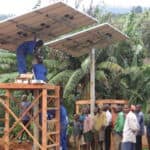Impact Investing and the Profitability Challenge in Off-Grid Solar: Oikocredit Joins the Debate
With 1.2 billion people without access to electricity, the number of off-grid solar companies is increasing rapidly and the market is evolving. In 2016, more than 100 home solar companies were targeting people without energy access, yet a decade ago the sector barely existed. Questions are being raised: Is the off-grid solar sector a hype, or will it continue to expand and create the social and environmental benefits it points toward?
As a social impact investor with over 40 years of experience, Oikocredit first invested in off-grid solar in 2007 and established a dedicated renewable energy team almost three years ago. Through the lens of this experience, we can add to the discussion around the main topics that other investors and analysts have recently raised.
The viewpoints recently presented by a range of investors in the off-grid sector have revolved around three key questions:
- Will off-grid solar companies become operationally profitable so that they are less dependent on equity and debt in the future?
- What is proving to be the most successful off-grid solar business model?
- Is achieving financial returns starting to compete with social impact?
This article focuses more on the financial side, aiming to answer the first two questions; we’ll focus on social impact in an upcoming article.
A question of profitability
The first standout trend is the growth of the off-grid solar market, in terms of the number of companies and the level of investments flowing into these companies (referred to as off-grid solar companies from now on), particularly those operating in Africa. Investor Ceniarth recently raised concerns that off-grid solar companies may not be able to keep up with the high level of investments being made available, pressuring them to achieve very high growth in a short period of time. A worry is that large amounts of money are being pumped into the sector while core business model issues are not yet fully solved. In contrast, Persistent Energy Capital is of the opinion that investments are still far too low considering less than 1 percent of sub-Saharan Africa’s off-grid market has so far been reached.
In Oikocredit’s experience, we see the pressure to grow fast as an innate feature of an off-grid solar company. But it will be important for companies not to keep “burning” equity and grant funding in order to grow fast and gain market share without focusing on portfolio quality and generating their own cash in the medium term.
For off-grid solar companies to achieve economies of scale and positive operational cash flows, they need to attract customers in large numbers. This is also related to a costly operational model: Off-grid solar companies are pioneers moving into untapped areas distributing a new product. A large amount of capital is required to support such high growth. IFC reports that aggressive growth rates and high levels (50-90 percent) of consumer financing of solar systems could make distributed energy service companies (DESCOs) reliable on debt for another eight-15 years before they start generating cash themselves. However, once this turning point is reached, DESCOs with higher growth and customer acquisition will generate more cash.
Oikocredit agrees that most off-grid solar business models – especially the pay-as-you-go (PAYG) models – need a lot of cash up front and a large number of customers to eventually cover costs. This results in a catch-22: More customer growth means more cash is needed, but more cash requires profitability to convince investors and lenders to put their money at risk. Off-grid solar companies typically set themselves ambitious growth targets, but the market demand does exist and Oikocredit is already seeing the execution of the off-grid model improving to better serve this demand. To present growth projections and funding needs clearly, Oikocredit advises companies to separate projections of customers, existing and new, that represent the portion of the portfolio to be funded.
As an investor founded on social values, Oikocredit is willing to support the development of the off-grid solar sector in the long term. We see a role for ourselves in supporting promising companies with funding to grow to profitability and build the track record that banks need, because although plenty of money seems to be available, the structure of the available financing may not yet suit off-grid business needs. According to the “Global Off-Grid Solar Market Report 2016,” availability of working capital and local currency financing, in particular, are viewed as main market drivers for solar sales. Oikocredit considers local currency funding to still be limited, while the de-risking of investments through structures such as securitization show that financing off-grid solar companies is still far from mainstream balance sheet financing.
It seems that if you want to invest in the off-grid sector you have to have patience, as investor support will be required for the long haul. Oikocredit sees it as a positive development that international investors are taking that leap into long-term support of the off-grid sector, which will hopefully make local investors more comfortable so that off-grid companies can benefit more from local currency funding. At the same time, we encourage investors to support their investees in improving their business models and operations to become financially sustainable in their existing markets. As business models adjust and portfolio quality stabilizes, the perceived risk of investors may decline and providing a loan to an off-grid solar company may in some cases look increasingly like providing a loan to a regular non-banking finance institution.
Finding the right business model
A second, emerging trend seems to be that many off-grid companies that start providing PAYG services are moving from operating as technology suppliers to operating as financing companies. On the back of the expansion of mobile phone networks and mobile banking services they bring remotely controlled and paid energy services to rural households. In many ways, PAYG solar companies have built the first scalable model for providing asset financing to unbanked consumers, writes Alexander Sotiriou with CGAP. This transition means that off-grid companies have to apply a new approach.
In Oikocredit’s experience, remotely switching off solar systems when customers skip payments is not enough to keep non-payment percentages low. The integration of good customer credit checks and the inclusion of quality as well as growth targets for portfolios is also crucial. We see companies that lack credit procedures struggling with high levels of delayed or non-payment. In our experience, a good reference point to improve customer repayment as well as protection are Smart Microfinance’s Client Protection Principles. These principles can benefit customers as well as the company by applying best practices regarding product design and delivery, prevention of over-indebtedness, transparency, responsible pricing, the treatment of customers, and mechanisms for complaint resolution.
So what are the main reasons that customers are not repaying on time and how are business models adjusting in response to this? A number of key reasons we have seen include customers not understanding that they are taking out a loan; affordability; mobile payment difficulties; technical malfunctions; and competition from low-cost alternatives. Responses include better credit risk assessment; increasing loan terms (which reduces monthly costs); changing sales staff incentives; better customer segmentation; a clear repossession policy; providing systems and appliances that suit customer needs better, and focus on markets in which quality of solar products is controlled.
The bottom line is that business models are still adapting to local conditions while trying to reach profitability. However, in Oikocredit’s experience, the following elements will contribute to an off-grid solar company’s success:
- High-quality, robust and affordable technology
- Focus on markets with a good enabling environment (well-developed mobile money infrastructure, accessible communities, the existing grid is far away or offers low-quality service, acceptable payment behavior, supportive legal framework)
- An efficient distribution system
- Well-defined credit risk assessment, provisioning and repossession procedures
- Incentives for sales staff to sell products as well as maintain portfolio quality
- Active and readily available customer and after-sales services
- Strong management team with local knowledge and quick response within a dynamic environment
- Strategic shareholders that offer relevant guidance as well as financial support
- Secure low-cost funding
Some newer off-grid solar companies that are not necessarily first-movers have been able to solve some of the above-mentioned challenges by not focusing on the whole product chain, which had been the preferred model for several years. Examples include companies offering systems from multiple suppliers to keep track of the declining prices of systems and solar appliances, as opposed to only offering one brand of solar system. In addition, it’s possible to significantly decrease costs by finding reliable partners to distribute products in remote areas that can retain the quality of service. Finally, collaborations with national governments before growth is scaled up could also prove to be a competitive advantage. Benefits include access to government guarantees, quality standards or assistance with product marketing and/or repossession.
Overall, the off-grid sector still needs to mature and investors will have to be flexible as mistakes are made and learned from. We agree with Ceniarth that core business model issues should be solved before scaling up to prevent too much equity being used toward high growth instead of portfolio quality. On the other hand, Oikocredit sees that markets differ per location and are changing rapidly. Naturally, not all companies will survive the competition. Success will depend on efficiency, customer satisfaction and payment behavior. The off-grid solar company that can cater to their customers’ needs and knows their behavior the best will most likely prosper.
Laura de Bresser, a renewable energy project analyst for Oikocredit International, wrote this blog with input from other members of the renewable energy team.
Photo by Sameer Halai (SunFunder) for Power Africa via Flickr.
- Categories
- Energy, Investing, Social Enterprise



